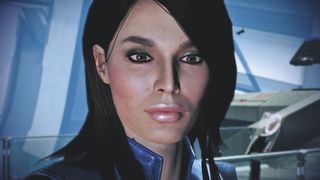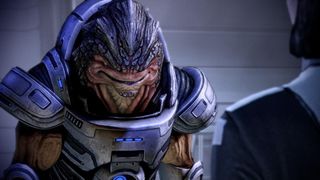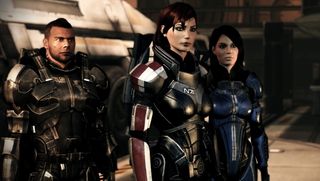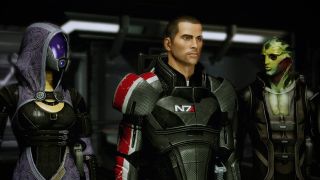In praise - and defence - of Ashley Williams, the most contentious character in BioWare’s sci-fi epic

Mass Effect will be ten years old this year. I don’t know about you, but I think I’d prefer to contend with civilisation-consuming immortal robo-squid than confront the actual process of entropy that this last decade represents. Even so, some things weather time better than others – and I’d argue that BioWare’s sci-fi opus, even the rough-in-parts first game, is one of them.
This was an intelligent, dramatic and accessible marriage of the RPG and action game, taking what had worked about Knights of the Old Republic and retooling it with a larger audience in mind. Accessibility means more than shooting and conversation wheels, mind: 2007 also marks a strong first step towards better, more inclusive writing. That effort starts, for me, with Gunnery Chief Ashley Williams – among the first of Commander Shepard’s companions, one of my favourite characters in the series, and the one most likely to have been left strapped to a nuke on Virmire about two-thirds of the way through the first game.

In order to explain why I like this character so much I’m going to have to address the krogan in the room: space racism. The notion that Ash Williams is a bigot whose views warrant her being sidelined – even sidelined to the point where you leave her to die in a nuclear explosion – is pretty widely held. ‘Ash is a space racist’ is something that somebody said once that has thrived in comments threads and forum discussions. It’s snappy and easy to echo, if nothing else a fascinating example of how particular perspectives become dominant in fan communities through repetition – even when they’re wrong. Which this time, they are.
This idea stems from one of the first ‘off the record’ conversations between Williams and Shepard in the first game. At this point in the series, ‘can we trust aliens’ is a recurring theme. A few human characters encourage ready cooperation, and a few encourage caution – Williams is in the latter camp, along with Navigator Pressly. Their argument is actually pretty sound: the turians went to war with humanity in living memory. The races of the Council often act primarily in the best interest of their own species, rather than the whole. Shepard’s enemy, Saren, is a turian specifically opposed to humanity, and at this point in the game – before the nature of the Reaper threat is known – it’s believed that Saren’s aims are political.

This is essentially what Ash says in that early conversation: the Normandy is a top-secret ship on a top-secret mission, and humanity is sharing it with people whose objectives we don’t fully understand. She uses the example of a dog-walker encountering a dangerous bear in the woods and abandoning their beloved dog to save their own lives. I’ve seen people interpret this as ‘Ash compares aliens to animals’, but this is completely incorrect: in this analogy the Council is represented by the dog-walker, and humanity is the dog. She worries that we’re at risk of being left in the firing line by aliens that will ultimately prioritise protecting their own people – and she’s right, as it turns out.
Late in the game, if you bring her to a pro-humanity demonstration on the Citadel, she’ll aggressively oppose its leader’s views – time on the Normandy has changed her mind. She forms friendships with Garrus, Tali and Wrex. In the second and third game, she no longer has this attitude. Even so, that one conversation in the first game has left an indelible mark on the character.

I find this situation fascinating because Ash’s value to the series comes specifically from the fact that she’s willing to voice challenging views. In the RPG genre, there is a tendency for companion characters to be written for the player’s benefit. They’re secondary characters in their own lives, and if they disagree with you then it’s likely that your job is to either prove them wrong or ultimately kill them (Wrex, for example.)
Sign up to the GamesRadar+ Newsletter
Weekly digests, tales from the communities you love, and more
Ash is different. She arrives fully formed with a history and a set of values. She has a positive relationship with her family and with faith – and not Space Faith, either, but actual terrestrial real-world faith. She’s believable as a person: she tells jokes that aren’t always funny and says things that aren’t always appropriate. There’s the sense that she could have been the protagonist. She’s the one who lost her entire unit after Saren’s attack on Eden Prime, after all, and it’s Ash that goes back to the Alliance to continue their work after Shepard’s temporary ‘death’ at the hands of the Collectors.

I sometimes wonder if Ash’s unpopularity stems from the fact that she isn’t there for the player to ‘fix’. This is the pattern elsewhere, most notably in the second game – out of a dozen companions, only a handful of them don’t require you to step in to resolve their daddy issues. Ash’s own backstory revolves around the way that she’s been sidelined in the military because of the actions of her grandfather, but she’s already overcome most of those obstacles by the time you meet her. And after Shepard goes rogue in the second game, she quickly steps in to ask if you know what the hell you’re doing. It’s not until mid-way through Mass Effect 3 that the two resolve their differences, and that’s if they don’t shoot each other first.
I’d love to see more writing like this. Companion characters are at their best when they’re written like real people, and real people don’t exist for the benefit of a protagonist. Ten years on, the industry as a whole has made stop-start progress in this regard – and it’s more obvious than ever that Mass Effect was ahead of its time.
This article originally appeared in Xbox: The Official Magazine. For more great Xbox coverage, you can subscribe here.

Heck yeah, the Paradise Killer studio is working with a prominent horror dev on an open-world management RPG about an ex-Yakuza and his Japanese mascot recruits

Who is Bastion? The comic history of the secret villain who has been hiding in X-Men '97 all along

Todd Howard says Baldur's Gate 3 wasn't some "overnight success" for Larian: "Have you played their previous games?"
Most Popular





